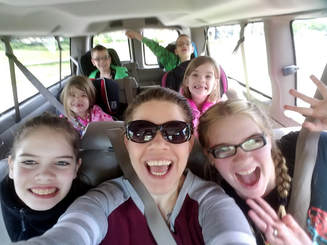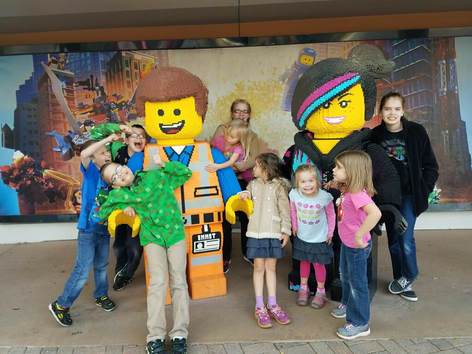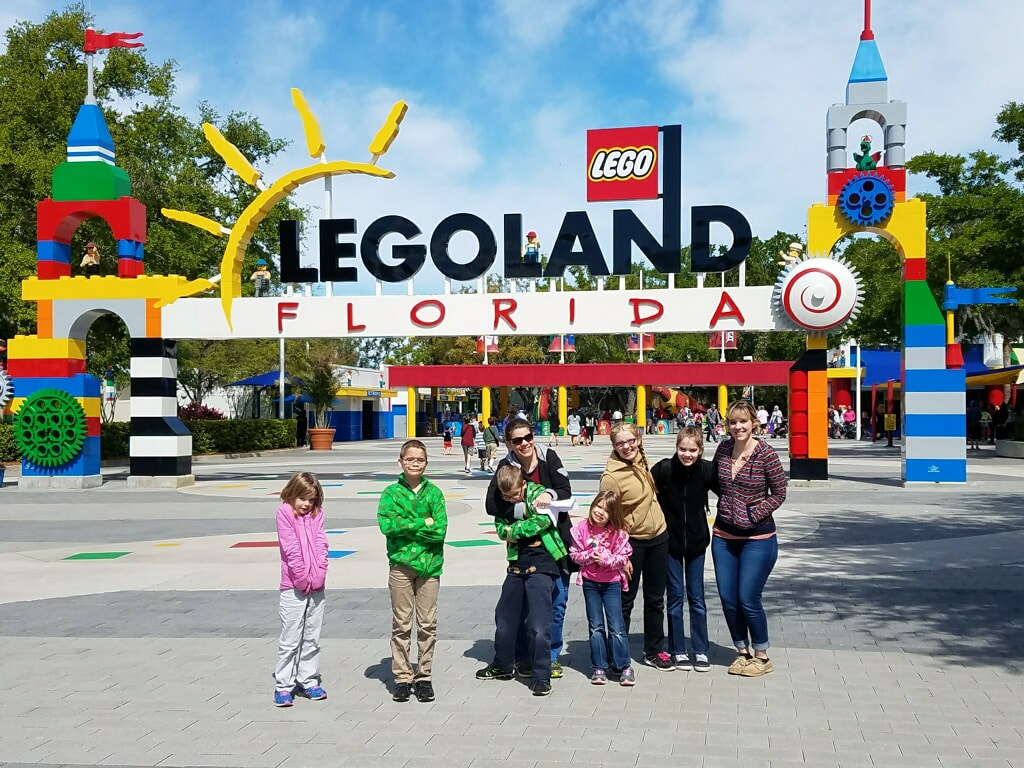 Recently, I broke one of my cardinal rules. I took a single day off of school. But, if I counted it as a day off of school, it would throw off my entire week numbering system. Rather than be completely off for the rest of the year with weeks not ending in multiples of 5 and our math and spelling tests days switched around, rather than experience those horrors, I decided to “count” the day as a day of school. In fact, I am aware that other schools often count such days as “school days.” We didn’t stay home and do nothing, although that would actually be a “day off.” Instead, we went to Legoland Florida. (Thank you Legoland for “homeschool day” prices! Now if only Disney would get on board…) So I don’t think I’m too far off in counting the trip as a field trip and thus a day of school, but it still seems sketchy to me. I’ve seen schools counting a trip to the movies as educational. Or a trip to the bowling alley. I know as a homeschooler we are supposed to find education in all aspects of our lives and I am not above making my kids calculate, sitting at the breakfast table, how many Cheerio boxes we will eat in a week if each child eats two servings five days in a row. But, the movies? I have never counted “field trips” as days of school. We go to the zoo, we go to the park, we go to the movies, but none of these are counted as “school.” So, for me to count Legoland was a big departure from the norm, (although, given the catastrophic alternative, who can blame me?) and I thought I would sit down and see just how “educational” the trip really was. 1. Telling Time. The first piece of education my kids learned was that driving two hours in the car is a long time. They had many opportunities to question just how much time had passed and how much more time was left. I admit that a few times I told them that five minutes had passed since the last time they had asked and they could figure out for themselves how much time was left in the trip. So, yes, educational. 2. Driver’s Ed. All of my children are too young to even be thinking about Driver’s Ed (And I’m talking to my 13 year old too! Dream all you want, Sweetie, it’s still years away!). But they learned no matter how many times the car you are caravanning with calls you to demand that you drive faster, a fifteen passenger van will start shaking at 75 miles an hour, which is five miles over the speed limit. So obeying the law is a must. (I’m thinking that making my children take their learner’s permit test in the Sandcrawler (our name for the van) might be a good idea.) Educational? Sure. We can chalk that one up to Social Science. 3. Measurements. All of the rides at Legoland have height requirements. The little kids had to step up to a yardstick to see if they met the mark. We’ll call that learning about inches and measuring things. Another educational check. 4. Social interaction. This is the one that people are always accusing homeschoolers of missing. “But how will they know how to get along with other people if you never let them out of the house?” Nothing says social interaction like 10 kids under the age of 13 trying to walk around Legoland together. They learned about the buddy system and getting lost and generally getting on each other’s nerves. The five adults who went also got to experience these things, but we added in yelling and scolding and pulling our hair out, so I’m not sure how educational that is. 5. I’m racking my brains here for more… Ah! More Driver’s Ed. A few of the kids survived the half hour long line (that seemed to take a million times longer) in order to drive little Lego cars around a miniature road system, complete with stop signs and crossing traffic. I’d like to say this was educational for the kids, but I think I learned more than they did. I learned that no matter how many times you are yelling “Stop!” to a six year old who is behind the wheel of a car, they are really not going to be paying attention. Which, one could argue, might be why six year olds are not allowed to drive real cars, only bumper cars, because every car that they drive is going to wind up a bumper car. 6. Peer pressure. Does this count as educational? I don’t know. I do know that peer pressure is something that other parents are always talking about. They act like only their children’s friends exert this pressure, but I’m here to tell you that my kids can peer pressure each other just fine. I don’t know how it’s done in the “real world” but in our house it’s done through mocking and nagging and lots of sarcasm and eye rolls. My eldest daughter was nervous about riding a roller coaster and through the use of all of the above we got her on one and strapped down, where she discovered that she actually enjoyed it! So, sometimes peer pressure can work for good. (I won’t tell you the looks I got from another mother who was trying to reassure my daughter about the safety of the ride just before I turned around and said, “This is a wooden one, Grace. They have the highest number of crashes.” True? I don’t know. But the look on her face was worth it.) 7. I just thought of one more! Map reading! They had to use the Legoland map to find out where they were and which path was the best to get where they wanted to go. Really practical in this day and age of Google maps? I don’t know. But it should count for something. I could probably keep stretching things and making them sound educational, but I’m still not completely sold that Legoland should actually count as a field trip. Maybe I should have made them write a paper about it when they got home. I did make them double up on quite a bit of school that week, all of the important subjects got covered, so I don’t feel too bad about not counting it as a day off. What do you think? Do you count trips to the zoo or the grocery store as school? What makes a field trip a field trip? What makes a day outside of the classroom educational? Let me know, I’d love to hear your thoughts!
4 Comments
Zayani Mandigo
5/20/2018 02:41:12 pm
Not every field trip has to have a set of educational objectives. I think it’s okay to take a day off once in a while and have fun. Bond with your kids, let them see you laugh. Even traditional school teachers value those moments when they just get to hang out with their students in a casual setting.
Reply
5/21/2018 12:07:10 pm
You're so right. Play and building relationships is important for child development. I know that the memories my kids are making with their cousins and with each other will last for the rest of their lives and that is priceless!
Reply
Leave a Reply. |
Erin Evans
You know that family that shows up to church in the 15 passenger van? The one that homeschools? Ever wondered how they make it through the day or wished you could be a fly on the wall of their house? Well, I'm inviting you in. I'm 36 and I ride herd on 8 children (oldest is 12), 3 cats, 2 bearded dragons, and one puppy. It's loud, chaotic, and imperfect. Welcome to Life in the Big House! Archives
November 2018
Categories
|




 RSS Feed
RSS Feed
